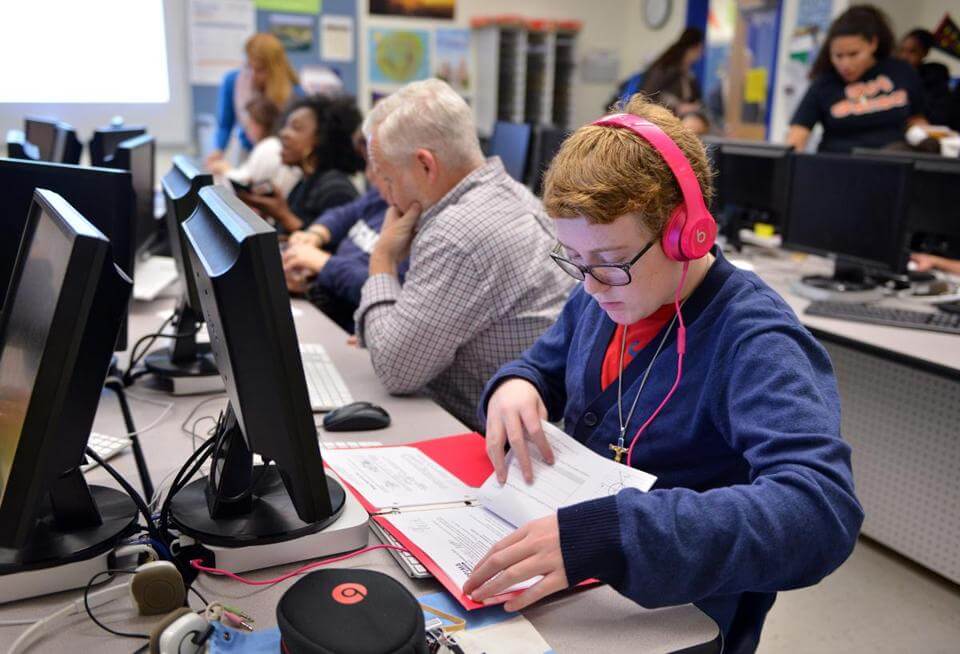
Erin Noon didn’t go to college, so when it was time for her son Benjamin to start thinking about higher education, she was lost.
She didn’t know how to help him search for the right school, fill out an application, apply for financial aid, or track down loans and grants. And the thought of trying to save for the huge expense was overwhelming.
“It was really daunting,’’ said Noon, who lives in Lynn with her husband and two sons. “We’ve never done it before, so we knew nothing about scholarships or college applications. We knew nothing about everything.’’ But then they learned about FUEL Education through Benjamin’s school, KIPP Academy Lynn Collegiate High School.
FUEL — an acronym for the organization’s old name, Families United in Educational Leadership — is a Boston-based college savings program that matches within a certain range the amount each family saves for a student’s education.
But it does much more than that, teaching low-income families — many of whom are immigrants — how to navigate the higher-education process, from finding the right school to paying for it. Through a series of monthly workshops, the program, which partners with schools and community organizations in Lynn, Chelsea, and Boston, focuses on helping the entire family, not just the student. Each student who completes the program is eligible for a match ranging from at least $600 to as much as $1,500, and the program also shows families how to access other grants, scholarships, and financial aid.
“It’s really a college-access curriculum,’’ said Bob Hildreth, a philanthropist and economist who founded the program in January 2009. Hildreth said he was convinced that low-income families would be willing to save money for education if given the proper tools. “We are not kidding ourselves that $1,000 is enough to go to college, but what it does is get the parents engaged. It gets their head in the game to look at the whole college process.’’
FUEL Education’s first partner site was La Vida in Lynn, which provides college resources to low-income Latino students. It later moved into KIPP in Lynn, the Chelsea public schools, and five community organizations in Boston, including the Boys & Girls Clubs.
Noon started in the program two years ago, when Benjamin was a junior. Today, she’s also participating with her son Jonathan, a freshman. “We feel so much more comfortable,’’ Noon said. “It’s an incredible resource that we’ve been given the opportunity to take part in. It’s still going to be a little scary, but there are so many things we’ve learned.’’
While the program started out serving families with high school students, Hildreth said FUEL has expanded its reach, with resources now available to families with children as young as kindergartners. To date, FUEL Education has served about 750 students who have saved close to $650,000 toward college. Currently, there are 150 students participating in Boston, 222 in Chelsea, and 189 in Lynn. More than 200 former FUEL students are enrolled in higher education and are working toward degrees. Eighty-five percent of FUEL families never saved toward college before joining the program. Participating families must attend monthly savings circles at which FUEL facilitators deliver workshops on topics such as college applications, financial aid letters, and the importance of networking.
“I talk to parents about all the topics, and give them advice on what they should be doing so they are prepared for the time when they submit college applications,’’ said Rochelly Fajardo, the manager of FUEL’s Lynn sites. “Many parents have little knowledge of the college process, and that’s the biggest challenge. When you see every deadline and every document, sometimes it can get overwhelming.’’ In addition to attending monthly workshops, families must open savings accounts and make regular deposits. No minimum amount is required, but families are asked to make progress toward their savings goals.
FUEL provides savings bonuses and other incentives that encourage families to save and stay involved. For example, families that attend each monthly meeting are entered into a year-end raffle for an additional scholarship. FUEL raises money for the matching funds by applying for grants from foundations and partnering with businesses.
Even though a couple thousand dollars may not seem like a lot when it comes to college expenses, it can make a big difference, said Laura Assade, the FUEL coordinator for the Chelsea schools. She said while the FUEL students are low-income and will be eligible for financial aid, families will likely still have other expenses, whether it’s covering a portion of tuition or paying for books.
FUEL also has financial agreements with several schools, including Bunker Hill Community College, UMass Lowell, UMass Boston, Salem State University, and Boston University. Assade said those schools offer scholarships only available to FUEL students.
Chelsea School Superintendent Mary Bourque said she is a strong supporter of the program. She said many students could get into college but don’t go because they don’t think they can afford it.
“It teaches families how to save and invest in their future,’’ she said. “They realize that the money piece is something that they can figure out. Taking the fear of the financial piece away is something we’re trying to do, because a student going to college lifts an entire family out of the cycle of poverty.’’ Noon, who expects to have saved about $1,200 for Benjamin after this year — including the match — said any amount helps.
“Everyone should think they are making a dent, because some is better than nothing,’’ she said. “I feel like I’m making a little bit of difference. Before, I didn’t even know how to start.’’